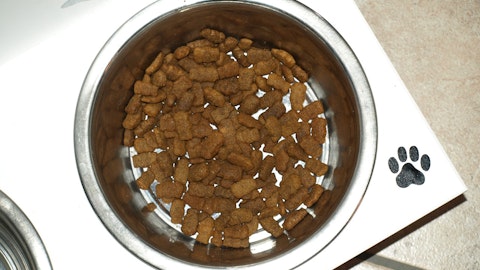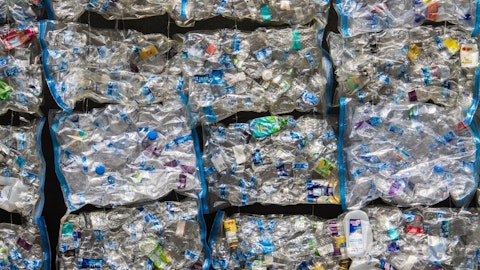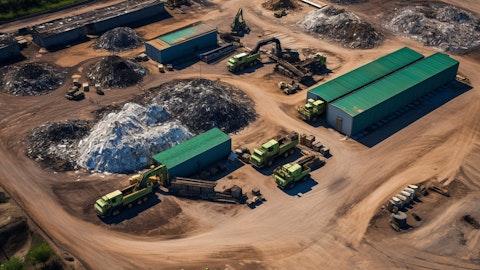In this article, we will look at the 20 high-paying dirty jobs that no one wants to do. We have also discussed the nature of dirty jobs and the ongoing transitions. If you want to skip our detailed analysis, head straight to the 5 High-Paying Dirty Jobs That No One Wants to Do.
In a society where certain professions are stigmatized, the pursuit of satisfaction in unconventional jobs raises intriguing questions. Despite the unpleasant nature of dirty work, research suggests that job satisfaction can thrive even in these environments. Deery, Kolar, and Walsh delved into the mechanisms behind this phenomenon, revealing that reframing the meaning of work, autonomy, relationships among workers, and task variety play pivotal roles. Workers redefine their roles positively, finding pride in their abilities and the meaningful connections forged with colleagues. Autonomy, particularly at the group level, fosters a sense of control and satisfaction, while strong work relationships offer support and security, transcending the workplace into personal life.
This study prompts organizations to reconsider their approach to job satisfaction, especially in socially marginalized work contexts. It focuses on the active role workers play in shaping their environment and highlights the significance of supportive structures within workplaces.
Nevertheless, the transition from “dirty” jobs to green ones in the United States has shown promising growth, with a tenfold increase observed between 2005 and 2021. Despite this progress, less than 1% of workers leaving carbon-intensive industries shift to low-carbon sector roles like renewable energy production or electric vehicle manufacturing. Data from the National Bureau of Economic Research highlights that most workers transitioning from dirty jobs end up in similar roles, perpetuating carbon-intensive practices. The study, analyzing over 130 million job profiles, underscores the challenge of effecting widespread change in the labor market amid climate concerns.To read more about green jobs, see the Fastest Growing Green Jobs in the World.
Certain demographics exhibit higher propensities for transitioning to green jobs, notably younger workers and those with bachelor’s degrees. However, disparities exist across regions, with some areas demonstrating low rates of transitioning despite significant dirty job populations. As initiatives like the Inflation Reduction Act allocate funding towards clean tech, the hope is to bolster the green workforce and mitigate the economic vulnerabilities of regions heavily reliant on fossil fuels.
It is interesting to note that most of the jobs on our list of dirty jobs have alot to do with the idea of unsustainability. This is because these jobs involve practices or systems that cannot be maintained indefinitely and may lead to resource depletion, environmental degradation, or social problems.
In a bid to combat plastic waste, a new facility in Rogers, Minnesota, spearheaded by Myplas, is revolutionizing recycling while generating eco-friendly employment. Addressing the challenge of recycling tough materials like pallet wrap and food packaging, Myplas transforms discarded plastic into reusable products. Backed by a $13 million investment from companies like General Mills, Inc (NYSE:GIS) and Target Corp (NYSE:TGT), Myplas emphasizes collaboration across the supply chain. With the potential to employ 200 individuals and recycle 90 million pounds of plastic annually, the facility exemplifies a circular economy in action.
Speaking of General Mills, Inc (NYSE:GIS), the company aims to slash its greenhouse gas emissions by 28% by 2025, charting a course through three primary avenues. Firstly, the company concentrates on sustainable agriculture, fostering practices such as regenerative farming and dairy management. Secondly, it optimizes production processes, curtailing emissions from activities like mixing and packaging. Supply chain efficiency measures like consolidation and using less emission-intensive electricity further this goal. Lastly, General Mills, Inc (NYSE:GIS) addresses consumption-related emissions, favoring products not needing refrigeration or cooking. Recycling initiatives complement these efforts.
Recognizing the environmental impact of food waste, General Mills, Inc (NYSE:GIS) partners with nonprofits to redistribute surplus food, preventing emissions from landfills. Over the past year alone, their initiatives have recovered billions of pounds of food and provided millions of meals for the needy worldwide.
On the other hand, headquartered in Houston, Texas, Waste Management Inc (NYSE:WM) is an important American corporation specializing in waste management, comprehensive waste solutions, and environmental services. Holding the title of the largest waste management company in the United States in terms of market capitalization, Waste Management Inc., alongside Republic Services Inc. (NYSE:RSG), manages over half of the country’s garbage collection. Serving a vast clientele comprising more than 22 million residential, industrial, municipal, and commercial customers across the United States, Canada, and Puerto Rico, the company has solidified its position as an industry leader with a workforce of 48,500 employees dedicated to garbage collection, transfer, and disposal operations throughout North America.
Waste Management Inc (NYSE:WM)’s extensive network encompasses over 346 transfer stations, 293 active landfill disposal sites, 146 recycling plants, 111 beneficial-use landfill gas projects, and six power production plants. Boasting a fleet of over 26,000 collection and transfer vehicles, Waste Management Inc (NYSE:WM) operates the most extensive trucking network within the US waste management sector. Its recycling efforts surpass 9 million tonnes annually, facilitated by 146 facilities nationwide catering to various recycling needs such as single-stream, electronic, organic, and construction waste recycling. Since its inception in 1968, Waste Management Inc (NYSE:WM) has experienced remarkable growth driven by both organic expansion and strategic acquisitions.

Photo by OCG Saving The Ocean on Unsplash
Methodology
For our list of high-paying dirty jobs that no one wants to do, we conducted extensive research on the internet to compile a list. We looked up the most unusual jobs that were either messy (physically), required physical labour, were socially frowned upon or involved unpleasant/harmful substances and odours. Our sources included platforms like Reddit and Indeed.com. We curated the list based on various percentile classes of average salaries. So the list is not necessarily wholly based on absolute averages. For data on salaries, we utilized the Bureau of Labor Statistics, Indeed.com, and ERI to ensure the accuracy and reliability of our article.
By the way, Insider Monkey is an investing website that uses a consensus approach to identify the best stock picks of more than 900 hedge funds investing in US stocks. The website tracks the movement of corporate insiders and hedge funds. Our top 10 consensus stock picks of hedge funds outperformed the S&P 500 stock index by more than 140 percentage points over the last 10 years (see the details here). So, if you are looking for the best stock picks to buy, you can benefit from the wisdom of hedge funds and corporate insiders.
Here is a list of the high paying dirty jobs no one wants to do:
20. Rancher
The job of a rancher is often avoided due to its physically demanding nature, exposure to harsh weather conditions, and the inherent dirtiness involved in handling livestock and managing land. Despite offering good pay, many individuals opt for cleaner or less strenuous professions. The average salary of a rancher in the US is $83,790. It is one of the jobs nobody wants but pay well.
19. Mortician
The job of a mortician is often considered “dirty” due to its association with handling deceased bodies and bodily fluids. Morticians deal with embalming, preparing bodies for viewing, and conducting autopsies, tasks that involve close contact with bodily remains and potentially hazardous substances. The average salary of a mortician is $63,869 in the US.
18. Proctologist
The job has a focus on diagnosing and treating conditions of the rectum and colon, which involves intimate examinations and procedures involving bodily waste. The nature of the work may be perceived as uncomfortable or taboo. The average pay for a Proctologist is $495,177 a year. It is one of the dirtiest jobs in the world.
17. Coal Miner
Coal mining is considered a dirty job due to the working conditions underground, involving exposure to coal dust, gases, and other pollutants. Miners endure physically demanding labor in confined spaces, often covered in coal dust. The average salary for a coal miner is $67,217 per year in US.
It is one of the dangerous jobs that pay well with no experience. To read more about dangerous jobs, see 26 Most Dangerous Jobs in the World.
16. Solid Waste Manager
They are responsible for the efficient operation of waste disposal facilities, implementation of recycling initiatives, and management of waste collection services. However, one drawback of this position is exposure to unpleasant odors and unhygienic environments, particularly when overseeing waste collection or disposal sites. On average, Aptim Corp offers an annual salary of $136,935 to solid waste managers.
15. Tool Pushers
Toolpushers face grueling conditions, enduring long hours in harsh environments, often far from home. Balancing production demands and safety, the job exacts a heavy toll mentally and physically. Despite the lucrative average salary of $173,519 yearly, it is one of the $100K jobs nobody wants to do.
14. Railroad Engineers
Railroad engineering often involves working outdoors in different weather conditions, exposing engineers to dirt, grease, and grime from locomotives, tracks, and machinery. Additionally, tasks such as maintenance and repair may involve handling oily components, contributing to the perception of the job as dirty. The salary range usually falls between $86,832 and $107,508 for railroad engineers in the US.
13. Roughneck
These jobs involve tasks such as handling heavy equipment, working in harsh environments, and dealing with greasy or oily substances. Due to the nature of the work, which often involves exposure to dirt, grime, and hazardous materials, roughneck jobs are commonly perceived as dirty. The 75th percentile salary for the role is $110,000.
12. Mine Manager
The role of a mine manager is often associated with dirtiness due to the environment in which they work. Mines are typically dusty, dirty, and can be hazardous due to the presence of various minerals and chemicals.
11. Landfill Gas Operator
Operating a landfill gas facility involves dealing with decomposing waste, which emits foul odors and harmful gases like methane and hydrogen sulfide. The job requires enduring challenging environmental conditions, such as exposure to toxins, extreme temperatures, and physical hazards. Moreover, the stigma attached to waste management contributes to the perception of the job as undesirable. The average salary of landfill gas operators in the US is $95,413 per year.
10. Crab Fishermen
Crab fishermen consistently battle rough seas, freezing temperatures, and perilous working environments on deck. The job demands long hours of strenuous labor, handling heavy gear amidst salty spray and fish guts. Additionally, the risk of injury is high, with slippery decks and heavy machinery posing constant threats. It is one of the creepy jobs no one wants.
Some fishermen have quoted earning as high as $150,000 to $170,000 per year. Even though their jobs are mostly seasonal, they usually earn around $50,000 for the work of 3-4 months.
9. Underwater Welder
The job of an underwater welder is considered dirty due to the hazardous conditions they face. They work in murky waters with limited visibility, surrounded by rust, sediment, and marine life. The welding process itself produces fumes and debris, adding to the challenging and gritty nature of the job. It is one of the high paying weirdest jobs in the world.
Underwater welders with a specialization in saturated diving can expect to earn as much as $300,000 per year.
8. Landscaper
The job has a strong association with physical labor involving soil, mulch, and plant matter. Workers often encounter dirt, mud, and debris while performing tasks like digging, planting, and mulching. Additionally, exposure to pesticides, fertilizers, and other chemicals used in landscaping may contribute to the perception of the job as dirty. In big states like California, landscapers can make as high as $62,227 per year.
It is one of the unique jobs that pay well with no experience.
7. Elevator Installers and Repairers
These professionals often encounter grease, oil, dust, and debris accumulated within elevator shafts and machinery. They frequently have to work in cramped spaces and at heights, exposing them to potentially hazardous materials. Additionally, the regular maintenance and repair tasks involve handling various mechanical parts, which can be covered in grime and require extensive cleaning. According to the Bureau of Labor Statistics (BLS), elevator repairers and installers earn a median annual wage of $99,000.
6. Nuclear Decontamination Technician
They work in contaminated environments, requiring meticulous cleaning and disposal procedures to prevent exposure. The work involves handling radioactive substances, contaminated equipment, and potentially dangerous situations, necessitating strict adherence to safety protocols to minimize health risks and environmental contamination. $69,000 is the 75th percentile salary for this job role.
Click here to see the 5 High-Paying Dirty Jobs That No One Wants to Do.
Suggested Articles:
Disclosure: None. 20 High-Paying Dirty Jobs That No One Wants to Do is originally published on Insider Monkey.





